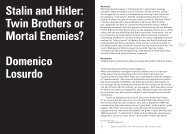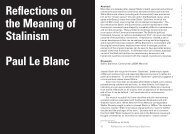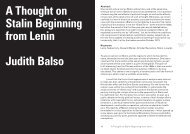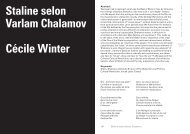adrian
adrian
adrian
- No tags were found...
You also want an ePaper? Increase the reach of your titles
YUMPU automatically turns print PDFs into web optimized ePapers that Google loves.
Encyclopedia Logic, the “drunk on God” (à la Novalis) talk of“the Absolute” so anathema to all permutations of deflationaryHegelianism (Pippin’s included) promptly follows and directly qualifiesthe ambivalent characterization of Kant’s transcendental unity ofapperception. This serves as a reminder of a fundamental feature ofpost-Fichtean German idealism beginning with Friedrich Hölderlin’s“Über Urtheil und Seyn” of 1795 and “The Earliest System-Programof German Idealism” of 1796, 98 a feature coming to form a red threadrunning across the entire length of Hegel’s intellectual itinerary: Theinfinite Absolute as substance also becomes self-reflective/reflexive inand through finite minded subjectivity, with the latter and its cognizing(self-)conscious activities remaining fully immanent to the substantial,absolute infinity out of which it arose as its ontological ground (if finitesubjective reflection were to fall outside of this infinity, the infinitewould be rendered finite, the Absolute less than absolute). 99 As thedeservedly celebrated preface to the Phenomenology already maintains,the Absolute, in its proper absoluteness, includes within itself reflectionon the Absolute (something maintained right on the heels of thefamous “Substance… equally as Subject” line). 100 Hegel warns therethat, “Reason is… misunderstood when reflection is excluded from theTrue, and is not grasped as a positive moment of the Absolute” (Esist… ein Verkennen der Vernunft, wenn die Reflexion aus dem Wahrenausgeschlossen und nicht als positives Moment des Absoluten erfaßtwird) 101 —with “the True” here being “the Whole” (Das Wahre ist dasGanze), 102 namely, the dialectically self-sundering absolute substancedividing into itself and its (self-)reflection in and through subjectivity.Hence, pace Pippin’s repeated maneuver of drawing Hegel close toKant’s epistemological finitism via the former’s mentions of the latter’stranscendental unity of apperception, Hegelian absolute idealism, bymarked contrast with Kantian transcendental idealism, recasts this unityas a transcendent-while-immanent transcendental function (re-)unified98 Hölderlin 1972, pp. 515-516; Hegel 2002a, p. 110; Vaysse 1994, p. 138; Pinkard 2002, pp. 141-142;Förster 2012, p. 279; Johnston 2014a, pp. 13-22; Johnston 2014b.CRISIS&CRITIQUE#3with an infinite ontological base. 103 Pippin’s deflationary finitization quaepistemological deontologization and deabsolutization of Hegel de-Hegelianizes Hegel himself.Additional moments in Hegel’s corpus bearing witness againstPippin’s Kantianization of him via the topic of apperception are to befound in “The Doctrine of the Concept” as the “Subjective Logic” of theScience of Logic (i.e., in the very same place from where Pippin extractsHegel’s admiring remarks about the first Critique’s “TranscendentalDeduction”). In fact, just a couple of pages later, the fourth paragraphsubsequent to the paragraph extolling the importance of Kant’stranscendental unity of apperception (albeit, as seen, with significantcaveats and reservations) states the following:…the Notion (der Begriff) is to be regarded not as the act of theself-conscious understanding (selbstbewußten Verstandes), notas the subjective understanding (subjektive Verstand), but as theNotion in its own absolute character (der Begriff an und für sich)which constitutes a stage of nature (Stufe der Natur) as well asof spirit (Geistes). Life, or organic nature, is the stage of natureat which the Notion emerges, but as blind, as unaware of itselfand unthinking (nicht denkender Begriff); the Notion that is selfconsciousand thinks pertains solely to spirit. But the logical formof the Notion is independent of its non-spiritual (ungeistigen), asalso of its spiritual (geistigen), shapes (Gestalten des Begriffs). 104Later in the Science of Logic, Hegel devotes the entirety of theintroduction to the third and final section of “The Doctrine of theConcept” on “the Idea” (die Idee) to dismissing subjective idealistunderstandings of the ideational. He emphasizes, by pointed contrast,that his Idea is an absolute idealist one essentially involving the identityin-differenceof the subjective and the objective. 105 All of this qualifiesHegel’s appropriations of Kantian critical philosophy both in the Scienceof Logic itself and elsewhere.With its proximity to the invocation of Kant’s “TranscendentalDeduction,” the preceding block quotation is crucial to appreciate at thisjuncture. The transcendental unity of apperception is situated at (andCRISIS&CRITIQUE#399 Johnston 2014a, pp. 13-22.100 Hegel 1977c, pp. 10-12.103 Quante 2011, p. 121.101 Hegel 1970c, p. 25; Hegel 1977c, pp. 11-12.104 Hegel 1969c, p. 257; Hegel 1969a, p. 586.102 Hegel 1970c, p. 24; Hegel 1977c, p. 11.105 Hegel 1969a, pp. 755-760; Hegel 1990, §162 (p. 128).398 “Where to Start?: Robert Pippin, Slavoj Žižek...399“Where to Start?: Robert Pippin, Slavoj Žižek...






